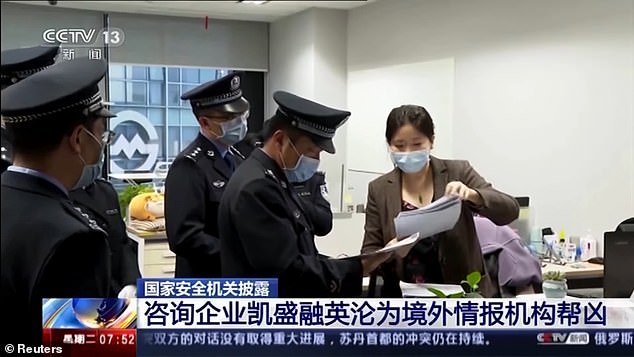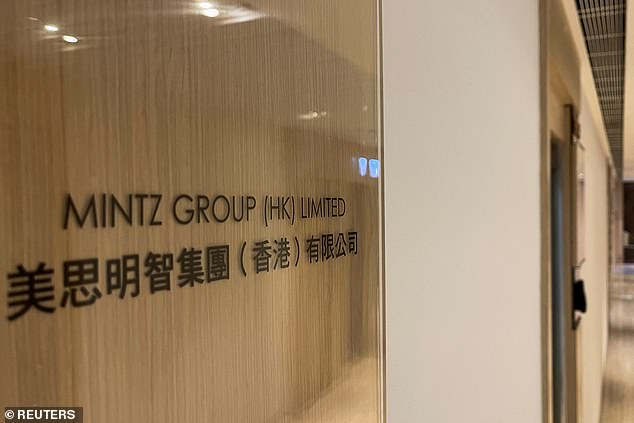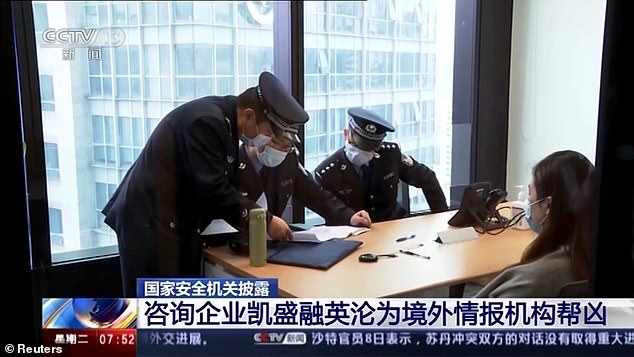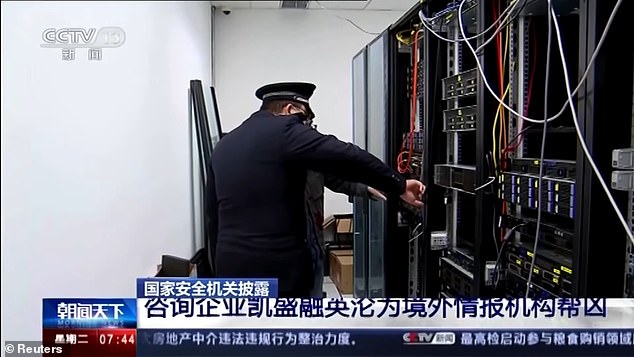The Chinese government has raided up to seven American companies operating there on suspicion of espionage over the past year, the US ambassador in Beijing revealed.
US Ambassador Nicholas Burns revealed the figure in an interview with 60 minutes which aired Sunday and highlighted a worrying trend for Americans who want to do business in China.
“On the one hand, they say, ‘We’re open for business. “We want American and Japanese companies here. “But on the other hand, they’ve robbed six or seven American companies since last March,” Burns said.
“They have entered American companies, they have closed them and they have made accusations that we believe are very unjustified,” he added.
Although several raids on American companies in China had previously been reported, the total cited by Burns is higher than was publicly known.

US Ambassador to China Nicholas Burns says the Chinese government has raided up to seven US companies operating there on suspicion of espionage over the past year.


Last May, China’s state television aired a program (above) showing a raid on the offices of consulting firm Capvision Partners, mocking the crackdown for the world to see.
Last year, China launched a crackdown on American consulting and due diligence firms, a move that business lobbies say made foreign investors nervous in the world’s second-largest economy.
In March, the Beijing office of the US consulting firm Mintz Group was raided and five Chinese employees were detained.
Mintz confirmed the detention of its employees and the closure of its business in China in a statement after the raid and was subsequently fined the equivalent of $1.5 million by Beijing authorities.
Chinese police also attacked the Shanghai office of US management consultancy Bain & Co in April.
Bain confirmed the raid on its Shanghai office without providing further details in a statement at the time.
Then in May, China’s state television aired a program showing a raid on the offices of consulting firm Capvision Partners, mocking the crackdown for the world to see.
Capvision said in a statement shortly after the broadcast that it would comply with national security rules, but declined to comment further.


In March, the Beijing office of the US consulting firm Mintz Group was raided and five Chinese employees were detained. The company’s Hong Kong office is seen above.


Beijing’s recent raid on Capvision, a consulting firm in Shanghai, over national security concerns sent shivers through China’s business community.
China expanded its counterespionage law in July, to the alarm of the United States, with sweeping updates that include banning the transfer of any information related to national security and expanding the definition of espionage.
“It is written in such a general way that it could be that American businessmen could be charged with espionage for engaging in practices that are perfectly legal and acceptable anywhere else in the world,” Burns said of the new counterespionage law.
He said standard “due diligence” on a company’s finances, which is used to guide decisions about an investment or joint venture, could be considered espionage under the new law.
“I think they want to control data on Chinese people, on Chinese companies,” Burns said. “I think that’s the crux of the problem for American companies operating in that space.”
Last year, China’s Ministry of State Security also asked its citizens to join in counterespionage work, setting up tip lines for people to report suspicious activities and promising to praise and reward them.
The ministry claimed to have discovered two citizens spying for the US Central Intelligence Agency, detailing how the accused were recruited and putting them under investigation.


Images broadcast on Chinese state television show the police raid against the consulting firm Captivision in May
The U.S. National Counterintelligence and Security Center said in June that China viewed the outbound flow of data as a national security risk, and that new and existing laws could force Chinese nationals employed locally by companies to assist in Chinese intelligence efforts.
The crackdown on alleged espionage has severely hit foreign investment in China, which the country urgently needs as its economy continues to lag after years of disruption caused by harsh pandemic lockdowns.
Last year, China’s foreign direct investment plunged 82 percent to $33 billion in net terms in 2023, according to the country’s State Administration of Foreign Exchange.
It marked the lowest level of investment in China by foreign companies in 30 years, and outflows exceeded inflows by $17.5 billion in the fourth quarter, marking the first net outflow on record.
